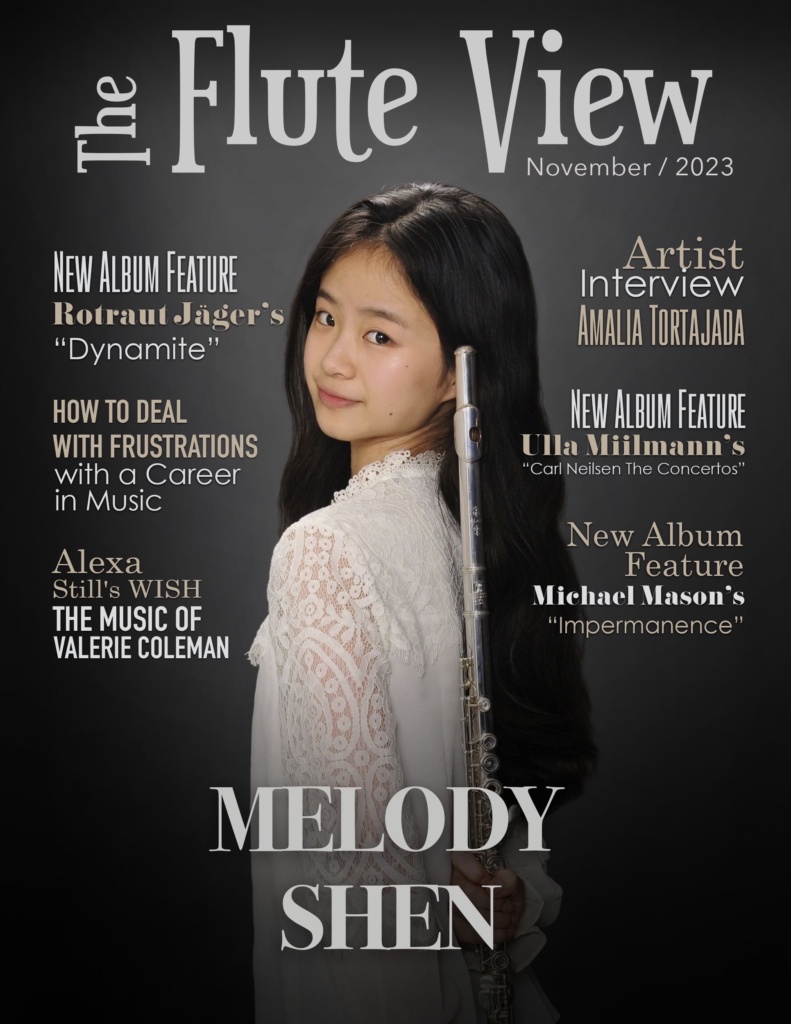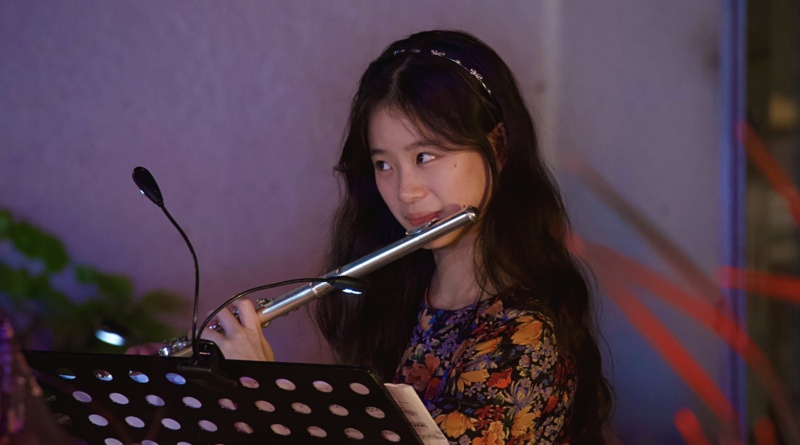Melody Shen Artist Interview
Born in 2006, aspiring young flutist Melody Shen has performed on major stages including Carnegie Hall, Merkin Hall, and Lincoln Center in New York, as well as venues in Italy, the Dominican Republic, Spain, and France. Melody has won awards in competitions such as the 2021 and 2023 New York Flute Club Young Artist Competition, the 2021 Alexander and Buono International Flute Competition held every 3 years, 1st prize and the special Gold Prize in the 2023 Camerata International Artists Competition, and the 10th and 11th Severino Gazzelloni International Flute Competition, an ex-aequo winner of the first prize in 2023. In summer 2023, she competed as a finalist in the National Flute Association’s High School Competition, toured with NYO2 (National Youth Orchestra USA 2), and was the youngest participant at the Festival International de Musique Classique à Puget: La Mélodieuse, where she worked intensively with composer Yuko Uébayashi and Orchestre National de France flutist Michel Moragues. Melody hopes to captivate and touch audiences by sharing her multilayered personality through her music.
Where do you study? with whom? What age did you start playing?
I study at the Juilliard Pre-College in New York with Carol Wincenc. I started playing the flute when I was around 11 years old.
Do you play another instrument other than flute?
What was it like to compete at the Gazzelloni Competition?
Participating in a major competition alongside 130 flutists from 32 different countries was a truly remarkable experience. It’s always interesting to hear the differences and commonalities in playing styles among musicians from different places.
The competition atmosphere is intense, but it's also characterized by a sense of camaraderie with mutual support and encouragement among competitors. Fortunately, everyone was very mature and there was no drama.
In the competition rounds, the judges are seated at a big table in the center of the hall. They all have very serious expressions while we perform and they write down comments. Once all competitors have performed, the judges deliberate for at least half an hour. Everyone waits nervously outside, and then we are called back inside the room. There are many emotions when the results are announced.
After each round, we have the opportunity to speak with the judges and receive their feedback. Every judge usually has something different to say, which can be confusing, but can also be very constructive and give us new ideas. Some of the advice is very strict and some is very positive.
I also think it’s fun to interact with the jury and find out that they are absolutely not as serious and scary as they look when they are judging us!
What did you play and why?
For the online preliminary round, I played Danse de la Chèvre by Honegger and the Telemann Fantasia in A Minor.
In the semifinal round, my selections were Enesco’s Cantabile et Presto and Martin’s Ballade.
And in the final round, I performed the Mercadante Concerto in E Minor.
In each round, there were options to choose from preselected required pieces of different genres (Romantic, Baroque, contemporary, etc.). I made my selections based on the pieces I felt would be the most enjoyable to learn and perform.
A significant factor behind my decision to perform the Enesco piece was its special connection to my professor, Carol Wincenc. She learned this piece when she was young from the renowned Marcel Moyse, and it was very meaningful for me to study it under her guidance.
I selected the Mercadante Concerto because it was the only Italian concerto among the three concerto options, and I thought: Italian competition, (mostly) Italian judges, Italian concerto… why not? I had reservations about the especially technically demanding and risky third movement, but I survived the challenge and my choice paid off.
Did you compete with your music memorized? Would you recommend this? Do you have perfect pitch? photographic memory?
Yes, I memorized all the music for all rounds of the competition, and I highly recommend it. After the competition, the judges also mentioned to me they enjoyed and appreciated the effort I put into memorizing all the pieces.
I don’t have photographic memory, but I do have perfect pitch, and I believe there may be a connection between perfect pitch and memorization ability. Sometimes, I do have to spend some extra time to score study and to use memory strategies, but overall, memorizing comes somewhat naturally to me. My approach to memorizing involves listening to recordings—I find that if I can hum or sing a piece, I can play it from memory.
The funny thing is, I genuinely dislike performing with music in front of me. I only perform with music when I am very unprepared or the piece is very contemporary. However, even in those rare instances, I’ve always had some issue of accidentally flipping 2 pages at the same time. And then comes the surge of panic that must be battled and contained mid-performance and I end up having to perform the skipped pages by memory anyway. I must be cursed or something(?). Anyway, this is why performing with music is scarier for me. Hopefully someday I can master performing with music on the stand, but I’ll stick to memorization for now.
Most importantly, I find that memorizing music enables me to play with a deeper understanding of the music itself beyond the page and from within myself, and it allows for a stronger connection with the audience.
Why did you decide to compete in a competition ABOVE your age?
Last year, I competed in the Gazzelloni 10th International Flute Competition’s Category A (ages 18 and under). This year I challenged myself further by entering Category B (ages 18-22). The thought of competing with conservatory flutists, some of whom were up to 6 years older than me, was intimidating. However, I also saw this as an opportunity to push myself by holding myself to a higher standard and explore ways to play with “musical maturity”.
How do you prepare for competitions in general?
I had one and a half months to prepare for the semifinal and final rounds of the Gazzelloni Competition.
The most difficult part of doing large competitions is balancing the preparation with maintaining my grades in challenging classes in high school. During school, I try to use the minutes before school, during lunch, and in free periods to study for tests or finish some homework.
On bus rides, I maximize my time by listening to my pieces to aid in memorization, noting areas for improvement inspired by other flutists' recordings, and planning sections to practice.
Once I arrive home, I lie on my bed and procrastinate for 20 minutes (just keeping it real here). Then I practice 4 to 7 hours, with dinner as a small break. I finish by 10:30 since my family goes to sleep, and I finish my remaining homework at around 11:45. Then sleep, wake up, repeat.
I admit it’s a difficult schedule to keep up every day until the competition.
The practice hours do take a toll on my physical health, causing some pain in my wrist, forearms, and a little bit of the back and shoulders. To manage this, I use ice and hand warmers at school, and reduce the practice time to 2-3 hours when it hurts extra.
It does get isolating too and it’s very easy to get trapped in stress and my own mind. But what keeps me going is constantly reminding myself of my overarching purposes I have for playing flute and how lucky I am to have something to pursue.
What do you like best about competitions?
My favorite part is developing relationships with various individuals, including fellow competitors, judges, staff, pianists, and the audience. It’s great to meet people with similar drive and goals as me, and it’s very inspiring to share and discuss our music and experiences.
I especially love to make friends with the kind adults in the competitions. I enjoy hearing their wisdom, being included in sophisticated conversations, and exploring the competition region with them. The Italian flutists in this year’s Gazzelloni Competition brought me to delicious restaurants and fun spots in Naples.
I’ve met so many wonderful people from each competition who are still my good friends and have had significant influence on me.
What have you learned from competitions? Any advice for others wishing to compete?
Competitions, especially the larger international ones, are highly subjective; the results can only reflect the personal tastes of the judges. And even the judges commonly disagree with each other!
I’ve found that the most effective shield against the potential heartbreak of unsatisfactory results is to cultivate curiosity and fascination in the learning process and to really enjoy the performance rounds.
Rather than being consumed by the pursuit of winning, it is far more fulfilling to engage in deep contemplation and studying of the pieces with genuine interest.
For the live rounds, I know I have no control over anyone's opinion of my playing, and excessive worry about it only adds to the nerves. My responsibility, after all the practice I put in, is to trust myself, have the most fun, and unapologetically show my personality through the music.
What 3 things would you offer as advice for a young flutist?
1. Don't limit yourself because you're "not good or experienced enough."
2. Try to absorb a little something from everyone.
3. Search for your own musical philosophy.


